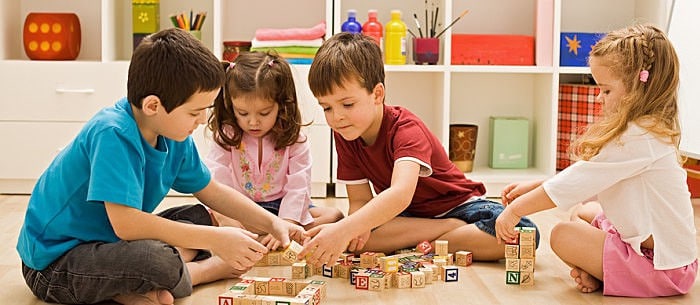Your little one just blew out four candles on her birthday cake. Get ready for a year full of social interaction and play! Since she’s already mastered her basic skills, her social development will grow by leaps and bounds in her fifth year of life.
“Language development finally takes a back seat, and the 4-year-old can communicate her increasingly complex ideas and see that her words have an effect on the world around her,” says Dr. Jeanette Sawyer Cohen, Ph.D., a clinical child psychologist and co-founder of Everyday Parenting Psychology. And read our guide to developmental milestones for kids.
Your social kid’s 4-year-old behavior
Four-year-olds have quite the social life! According to the American Academy of Pediatrics, by age 4, your child should have an active social life filled with friends — both within the neighborhood and at preschool.
“Some 4-year-olds also have a best friend, but the meaning is definitely different than in elementary school,” says Dr. Kirsten Cullen Sharma, Psy.D., clinical assistant professor at NYU Langone’s Child Study Center.
She also notes that 4-year-olds are more open to playing with all kinds of children, including kids with special needs.
And after so many years of mom-guided play, you can sit back a little as your 4-year-old starts to initiate social interactions with her friends — without your direction.
“Four-year-olds are more independent in social interactions and engage in back-and-forth exchanges,” Dr. Sharma says.
Don’t be surprised if they need short breaks.
Dr. Sharma notes that it’s not uncommon to see kids playing together for a few minutes, then walking away and playing by themselves for a few minutes. But when 4-year-olds are together, there’s less arguing than with toddlers. Your 4-year-old can share much better than a younger child.
“Toddlerhood is all about developing a sense of self. In contrast, a 4-year-old has the ability to take another person’s perspective,” says Dr. Cohen.
Children at this age are slowly developing the capacity for empathy, the ability to keep others’ perspectives in mind.
By age 4, your child has moved through the earlier phases of pretend play that relates to her day-to-day experience, explains Dr. Cohen. As your child creates increasingly complex story lines, her play becomes rich with fantasy — often including good guys versus bad guys.
“Four-year-olds use pretend play to both express the wish to be grown-up and to work through anxiety about being small,” says Dr. Cohen.
However, she notes that children of this age are still working on understanding the difference between real and pretend.
Your 4-year-old is also full of intense emotions, including jealousy, happiness, excitement, fear and anger. However, as Dr. Sharma notes, your child can now communicate her feelings much better than a younger child.
“If a 4-year-old is feeling frustrated, she is able to use words to explain why,” she says.
How you can support social milestones
To help encourage your child’s pretend play, join in — but don’t direct.
“Children at this age use pretend play to explore ideas and enact their fantasies, such as being powerful like a grown-up, as well as to conquer fears,” says Dr. Cohen.
She wants to act like the doctor, instead of being the one getting a shot.
To boost emotional intelligence and empathy, talk about feelings in your games and stories.
“When you’re looking at a picture in a book, you might ask your child, ‘I wonder what he’s thinking or feeling? How can you tell?’ and help them read body language and facial expressions,” suggests Dr. Cohen.
You can also help your child learn to become more self-aware by talking about her own feelings.
Dr. Sharma also suggests giving your child plenty of opportunities to engage with different children.
“Get your kids involved in different kinds of activities with different kids,” says Dr. Sharma.
This will expose her to a wide variety of personalities, which can boost social intelligence.
Remember, all children reach these milestones at their own pace.
“Parents need to know that there’s a wide range in development,” says Dr. Sharma.
Speak with your pediatrician if you have any questions about your child’s 4-year-old behavior.
*This article is for general informational purposes only. It is not intended nor implied to be providing medical advice and is not a substitute for such advice. The reader should always consult a health care provider concerning any medical condition or treatment plan. Neither Care.com nor the author assumes any responsibility or liability with respect to use of any information contained herein.






